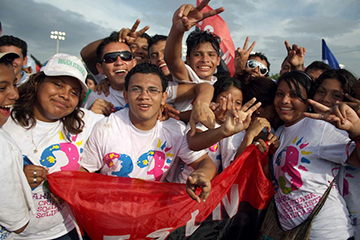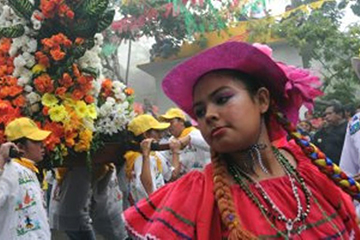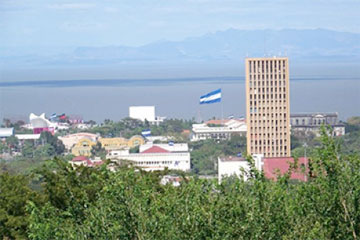Moscow - Managua - Moscow
I am walking through Managua ... and I still cannot believe that the last time we met was 20 years ago. And all around me it is not the same Nicaragua, with which I once had many journalistic dates; it is a completely different country. The people look the same – honest and enterprising, dreamlike and friendly. But they are, if you look closely, also a little different.
The country is not divided, as before, into two hostile camps - the Sandinistas and the "Contras." The Republic has become, as it were, multipolitized. There is no sharp distinction between "us" and "them." The Civil War and the "contras" are in the past, and the Sandinistas that returned to power are not the same. They have also become multipolitized. They are divided among themselves in a spirit of ideological pluralism. And each group has their own vision of the way to people's happiness. Take, for instance the Sandinista Renovation Movement, led by former activist of the Sandinista National Liberation Front (FSLN) Edmundo Jarquin, who now criticizes the government of Daniel Ortega and opposes it in alliance with the neo-liberals. New terms have been thrown into local politics - "Danielistas" or "Ortegistas" - this is what supporters of the current president of the country are called; "the official Sandinistas" are practical statesmen.
Daniel Ortega and his government now have a different battle cry, it is more inclusive - "Christianity, socialism and solidarity." The Sandinista government seeks to focus more on social issues, tries to help the poor more, allocating in the budget and from outside funds the means for social programs. Recently, for example, the government received some grant aid from international organizations; particularly from the European Union, and has decided to amend the 2012 budget in order to increase spending on education, health and the creation of more jobs.
The authorities are making regular payments to the neediest families. It is small money - a few tens of dollars a month, but as the local optimists say, "it's better than nothing." The authorities believe that with the current shortage of jobs such essential measures are necessary. According to official data, just in Managua alone, over 70% of people do not have regular work, but semi-legal work in the "informal sector" or a so-called "part-time jobs." But officially, they are unemployed. This problem is also awaiting their attention.
The authorities are also paying attention to rural development. Indeed, the agricultural sector is the basis of the Nicaraguan economy. At the beginning of 2007, when the Sandinistas led by Daniel Ortega won the election after a 16-year rule by neoliberal governments, and regained power, poor families were awarded 162,807 certificates of ownership (in private ownership) of parcels of land with a total area of 30 thousand square kilometers. In the near future the authorities have promised to give rural families who do not have their own land, another 4,000 square miles of unoccupied land.
Many observers have described the Sandinista policy as “populism ", as local engineer-agronomist Juan Rodriguez indignantly told me in Managua. If populism is good for the people, and saves them from their half-starved existence, how can it be bad! Our "liberals" and "conservatives" were not populists. They got rich "honestly» by exploiting the workers, who were paid so that they had to live on $ 2 a day. Our big media did not criticize them very much. However they lost the elections to us, the Sandinistas. Now they accuse the government of Daniel Ortega of populism...
My new Nicaraguan friend Juan Rodriguez is probably right. Also according to a number of international experts, the solution to many complex social projects for the benefit of the majority of the people and the country sits on the shoulders of the government of charismatic leader Daniel Ortega. The opposition accuses him not only of populism, but also in "caudillismo" and even in a "somocista style" of government. But so far these are all just words, words, words ... So who will do it? Only those who have long been accustomed to work, roll up their sleeves.
In a country such as Nicaragua, in which civil society is not yet fully formed, but fragmented into small parties and ideological groups, with no leader to consolidate a large group of people around him, it is hardly possible to implement major projects, such as a canal between the oceans, to generally change people's lives for the better, and to pull them out of poverty. Of course, it would be better to do it in a democracy and in social harmony. However, according to surveys of experts, "for its socialist, Christian and solidarity project" the FSLN party and its allies in Nicaragua attracts the most people. This is because that is where they see an opportunity to achieve economic development of society and social justice.

... Arriving in Managua, I quickly begin to enter political life, buying at road junctions two of the country’s major newspapers - "La Prensa" and "El Nuevo Diario". (Or open their sites on the Internet). In a most democratic sense, the print media is full of critical and "abusive" articles regarding the current Sandinista government. For all that one can accuse and blame all the wrongs on President Daniel Ortega and his closest ally, his wife Rosario Murillo; they are instantly splashed all over the newspapers, on the radio and given television airtime in Nicaragua. Rosario Murillo is the Coordinator for Information and Public Relations with civil society and in fact the most influential press secretary for the president and the government in the country. Can we can say that we have freedom of the press and freedom of expression in this country? Certainly, yes! This is often said even by the whole motley opposition. Though often reluctantly, even sarcastically. But freedom of the press in Nicaragua exists - it is a fact. However another thing is how the authorities respond to constructive, reasonable criticism. After all, the opposition does not hesitate to strike at the most painful and sensitive areas, such as the condition of the roads and transport, a slow electricity supply and communications to new homes, and the abundance of litter in towns and villages. They are also blamed for sluggishness in solving social conflicts in business enterprises, and the measly funding of science and culture. For a poor country there are many such sensitive areas. The authorities simply lack the funds to solve many problems. But the opposition does not sleep. It bites, bites, bites...
Once upon a time, in his famous book "The Nicaraguan" (El Nicaragüense) the famous poet and writer Pablo Antonio Cuadra drew quite a frank socio-historical and psychological portrait of his average countryman. Thus, in one of the passages he writes: The Nicaraguan has a dreamy nature, a fantastic personality, which sometimes reaches extravagant baroque. But ... when the Nicaraguan is faced with real life, it sometimes shows depressing limitations. Nicaraguans, or the Nicaraguan if in the singular, is in fact, a big blowhard. And if in the plural, the Nicaraguans are self-critical, and this self-criticism is expressed in a kind of sarcasm.
Of course, time and circumstances have partly changed the Nicaraguan. But in many ways his state of mind, and of course national character, retain the main characteristics given to him by the unforgettable Pablo Antonio Cuadra.
Indeed, humor and sarcasm are very common in Nicaragua.
An inflated and pompous person can be easily ridiculed, which is why, experts say, his dignity "can wrinkle and be pierced like a balloon." It is considered that this is the national method of psychological self-defense. Often faced with wars, conflicts, natural disasters, poverty, and brutal rulers, long ago Nicaraguans chose to back sarcasm and sarcastic jokes as major weapons. The people, especially the opposition, and political opponents of the current authorities, actively use their genetic weapons. This is clearly reflected in the modern Nicaraguan media.

... I have never seen so much joy on the faces of ordinary Nicaraguans! It is easy to explain. Firstly, it is because it has been a long time since I have been in this country. Secondly, my stay in Nicaragua coincided with the holidays, wave after wave of which swept across this poor-rich country. Why "poor-rich"? Because for all the misery in which most Nicaraguans live, a small number try their best not to live in poverty, some are even quite successful and are considered quite wealthy and there is even a wealthy elite. Although, of course, problems beset them all.
The biggest and longest holidays in Nicaragua start in July until August. Let me explain why: in July 1979, Nicaraguans tired of the dictatorial excesses and arbitrariness of the Somoza clan dictatorship, revolted and overthrew the brutal political regime. On July 17th, a bloodied President Anastasio Somoza Debayle and his relatives fled the country. Subsequently, he took refuge in Paraguay, but one day he was blown up in his limousine by a Sandinista commando team. The day of his flight, July 17th, was later declared a day of joy in Nicaragua.
Then, on 19th July 1979, the capital of Managua was completely liberated from the Somozas and since this date, Liberation Day/ Sandinista revolution day is popularly celebrated as a national holiday throughout the republic. This year, the Nicaraguans celebrate the 33rd anniversary of the victory over tyranny. Post - Somoza Nicaragua has reached the "age of Christ." That is the age at which the Son of God was crucified on the cross and rose again, finding holy immortality. Can we say that over the past few years of building a new, different Nicaragua, holiness has come to at least some of the people? Was this period marked by progress and achievements for the benefit of all Nicaraguans? In part, yes, in part no.
Yes, because the country is moving slowly but steadily in reducing the number of poor and illiterate. The Nicaraguan economy is not breaking any records, but it is still growing. Over the last 6 years, exports of national products reached $ 2 billion. The country has managed to attract almost $ 1 billion in direct foreign investment for its development. According to foreign experts, today Nicaragua is now the second best country in Latin America measured in terms of reducing social inequality and extreme poverty.
Currently, according to the Central Bank of Nicaragua, the monthly index of economic activity in the country is growing by an average of 5.3%. The country's economy is developing positively. The mining industry has gained in recent months by 9.2%, and the construction industry grew by 8.2%. It also shows a small increase in the production of such important areas as the cultivation of shrimp and seafood, as well as livestock. In a country of 6.2 million people there are more than 4 million head of cattle. Consumers in the U.S., the EU, and Russia are aware of the “taste” of Nicaraguan meat. Aromatic Nicaraguan coffee is also familiar in many countries around the world, including in Russia, although so far to a small degree.
In other words, despite the difficulties, problems, errors and contradictions, Nicaragua continues to develop and attempt to break out of historical poverty in the interest of the majority of its citizens.
In international politics, Nicaragua also has changed. In the early years after the revolution in 1979 the Sandinistas were determined to confront the "U.S. mercenaries", as during neoliberal rule the country almost completely re-orientated towards the United States. Now Managua has a cautious, well balanced, pragmatic foreign policy that is more oriented to attract potential donor countries to fight poverty. To this end, Nicaragua is trying in every way to diversify its foreign economic relations.
In a country that throughout its history has experienced several foreign interventions and devastating civil wars, they are well aware of the value of peace. So its focus is to maintain and strengthen itself, and to resolve all specific conflicts at the negotiating table. On the whole, Managua opposes the use of force in international affairs, and is in favor of the formation of a multipolar world based on respect for international law on regional issues. The Sandinista government seeks to strengthen the role of the United Nations and maintain stability in the region and around the world.
However, the republic can stand up for themselves in case of aggression. An army more than 10,000 strong protects the sovereignty and independence of the country. Today its units are also involved in combating the international drug mafia, and in times of disaster come to the aid of the civilian population.
…Nicaraguans are really looking forward to the implementation of ambitious projects such as the construction of the Tumarin hydropower plant, which will be the largest in Central America, construction of modern ports and the large inter-oceanic canal, and refineries that are capable of handling 150,000 barrels of oil per day. There are plans to set up new businesses and residential areas with convenient and affordable houses for workers. There are projects for the construction of new roads and railways.
But even if only part of the conceived plans are successfully implemented, it will be quite a different Nicaragua. Which one? A free, prosperous country that has established its important role in our rapidly changing world.
read more in our Telegram-channel https://t.me/The_International_Affairs

 0:08 21.01.2013 •
0:08 21.01.2013 •























